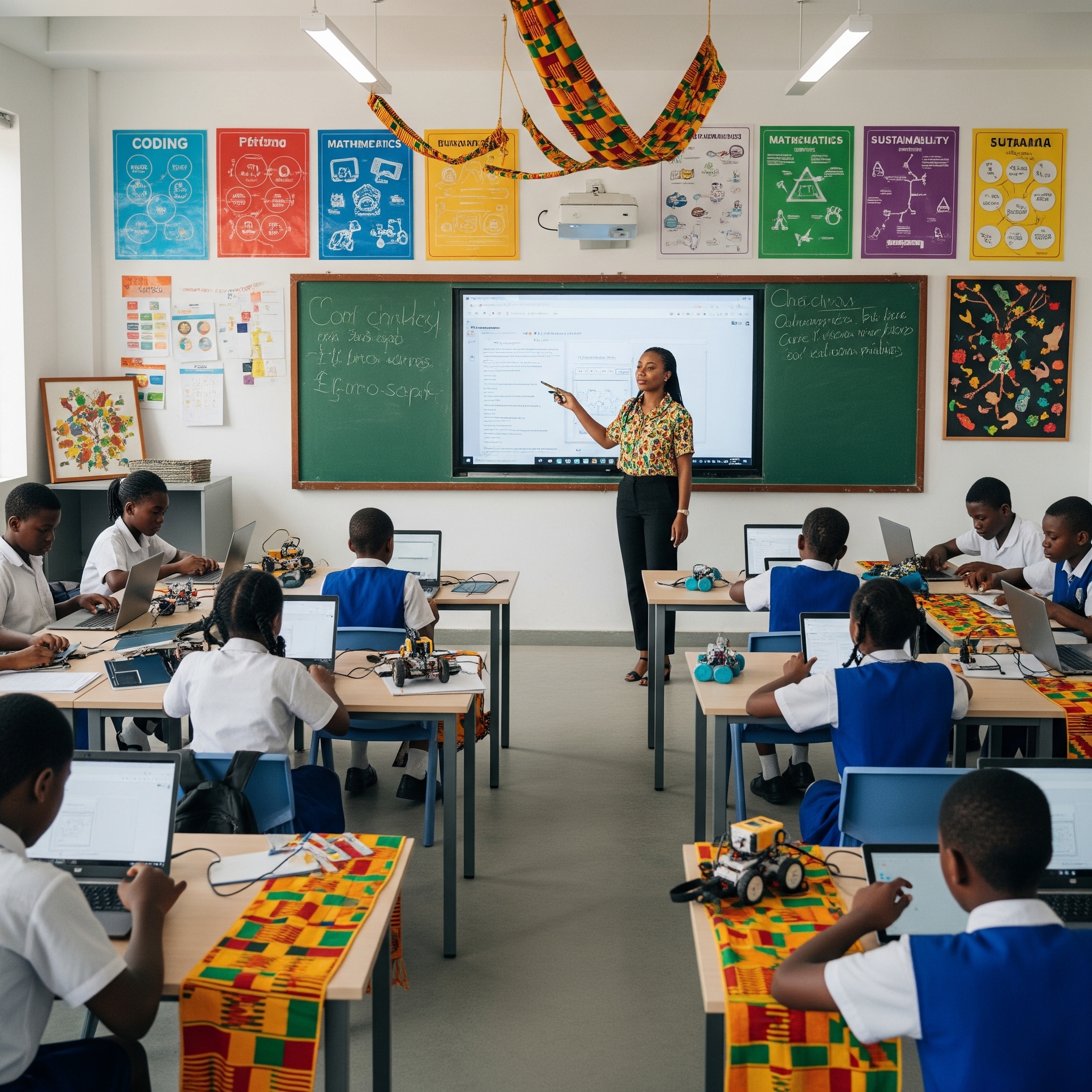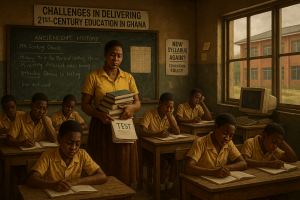Introduction
The Ghana Education System has made significant strides in recent years, aiming to equip students with the necessary skills to thrive in the 21st century. In this context, 21st-century skills encompass critical thinking, problem-solving, digital literacy, and collaborative skills, all essential for success in the modern world (Billings 2022).
Educational Reforms and Initiatives
Ghana has undertaken several educational reforms and introduced various initiatives to ensure that its students are well-prepared for the challenges of the contemporary world.
The Free Senior High School (SHS) Policy
In 2017, Ghana implemented the Free SHS policy to increase access to secondary education. This policy aimed to remove financial barriers and ensure that every Ghanaian child has the opportunity to complete secondary education. According to the Ministry of Education, enrolment rates have significantly increased, with over 1.2 million students benefiting from the program as of 2020.
Promotion of STEM Education
The government has placed a strong emphasis on Science, Technology, Engineering, and Mathematics (STEM) education to foster innovation and prepare students for careers in these critical fields. Key initiatives and efforts include:
- Establishment of STEM-Focused Schools: Several specialized schools have been established across the country to provide intensive STEM education. These institutions have state-of-the-art laboratories, equipment, and resources to facilitate hands-on learning and experimentation.
- Curriculum Updates: The education curriculum has been revised to include more STEM-related subjects and practical activities. This ensures that students gain a solid foundation in STEM disciplines from an early age.
- Teacher Training Programs: Continuous professional development programs have been introduced to train teachers in modern STEM teaching methodologies. This includes workshops, seminars, and certification courses to enhance teachers’ skills and knowledge in STEM education.
- Partnerships with International Organizations: Ghana has collaborated with various international organizations, such as UNESCO and UNICEF, to implement STEM education programs. These partnerships have provided funding, technical assistance, and resources to support STEM initiatives in schools.
- Extracurricular Programs and Competitions: Initiatives like the Ghana Robotics Academy Foundation have been instrumental in promoting STEM education outside the classroom. Students participate in robotics clubs, coding camps, and science fairs, which encourage creativity and innovation. Moreover, Ghanaian teams have excelled in international robotics competitions, showcasing their advanced skills and knowledge.
- Public Awareness Campaigns: The government and non-profit organizations have conducted public awareness campaigns to highlight the importance of STEM education. These campaigns aim to inspire students, especially girls, to pursue careers in STEM fields and break gender stereotypes.
Implementation of GALOP Program
The Ghana Accountability for Learning Outcomes Project (GALOP) is another significant initiative aimed at improving the quality of education. Launched in 2020, GALOP focuses on enhancing learning outcomes in low-performing basic schools, particularly in literacy and numeracy. The project targets approximately 10,000 schools and provides support in the following areas:
- Teacher Training: GALOP offers extensive training for teachers to equip them with effective teaching strategies and methodologies to improve student learning outcomes.
- Learning Materials: The program supplies essential learning materials, such as textbooks, workbooks, and supplementary reading resources, to enhance the teaching and learning process.
- School Leadership: GALOP also includes capacity-building programs for school leaders to strengthen their management and leadership skills, ensuring better school governance and accountability.
- Monitoring and Evaluation: The program implements robust monitoring and evaluation mechanisms to track progress and assess the impact of interventions on student performance.
Korean Mathematics Initiative
The Korean Mathematics Initiative is a collaborative effort between Ghana and South Korea to improve mathematics education in the country. This partnership aims to enhance the quality of mathematics teaching and learning through the following strategies:
- Curriculum Development: The initiative involves revising the mathematics curriculum to align with international standards and incorporate innovative teaching methods that promote critical thinking and problem-solving skills.
- Teacher Training: Ghanaian mathematics teachers receive specialized training from Korean experts to improve their pedagogical skills and knowledge of modern mathematics education techniques.
- Learning Resources: The initiative provides schools with high-quality mathematics textbooks, teaching aids, and digital resources to support effective mathematics instruction.
- Exchange Programs: The partnership includes exchange programs that allow Ghanaian teachers to visit South Korea and learn from their educational practices, as well as hosting Korean educators in Ghana to share their expertise.
Partnership with the UK on Critical Thinking
Ghana has also established educational initiatives in partnership with the UK to enhance critical thinking skills among students. These initiatives include:
- British Council Programs: The British Council has been actively involved in supporting education in Ghana through various programs that promote critical thinking. One such initiative is the Connecting Classrooms through Global Learning program, which aims to develop students’ critical thinking and problem-solving skills by connecting schools in Ghana with schools in the UK. This program facilitates collaborative projects and shared learning experiences between students from both countries.
- Teacher Training Workshops: The British Council and other UK-based educational organizations have conducted numerous workshops and training sessions for Ghanaian teachers. These workshops focus on innovative teaching methodologies that encourage critical thinking and interactive learning in the classroom.
- Resource Development: Collaborative efforts between the Ghanaian education authorities and UK partners have led to the development of educational resources and materials designed to foster critical thinking. These resources are integrated into the curriculum and used by teachers to create a more engaging and thought-provoking learning environment.
Success Metrics and Outcomes
Several metrics can be used to assess the success of the Ghana Education System in producing students with 21st-century skills.
Increased Enrollment and Graduation Rates
The Free SHS policy has led to a significant increase in enrollment and graduation rates. According to the Ghana Education Service, the transition rate from junior high to senior high school increased from 67% in 2016 to 85% in 2019.
Performance in International Assessments
Ghanaian students’ performance in international assessments, such as the Trends in International Mathematics and Science Study (TIMSS), has shown improvement. The 2019 TIMSS results indicated that Ghanaian students demonstrated better problem-solving and critical thinking skills compared to previous years. For instance, Ghana improved its ranking in mathematics from 46th place in 2015 to 42nd place in 2019, and in science from 47th place in 2015 to 43rd place in 2019. These results reflect the positive impact of educational reforms and initiatives aimed at enhancing STEM education.
Success Stories and Competitions
Ghanaian students have excelled in various international competitions, particularly in STEM fields. For instance, in 2019, a team from the Ghana Robotics Academy Foundation won the top prize at the Pan-African Robotics Competition, showcasing their advanced robotics and programming skills.
Resources
- Ministry of Education, Ghana. (2020). Annual Report.
- Ghana Education Service. (2019). Transition Rate Statistics.
- Trends in International Mathematics and Science Study (TIMSS). (2019). Ghana Report.
- Ghana Robotics Academy Foundation. (2019). Competition Results.
- Billings, T. 2021, 21st Century Skills Every Graduate Must. Jobberman January https://www.jobberman.com.gh/discover/21st-century-workplace-skills#:~:text=The%20full%20list%20of%2021st,curiosity%2C%20imagination%2C%20innovation%20and%20personal


